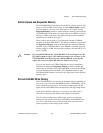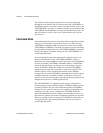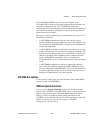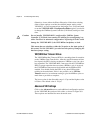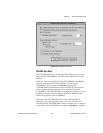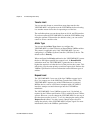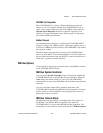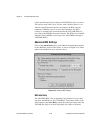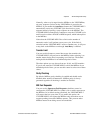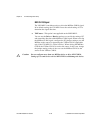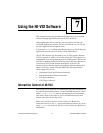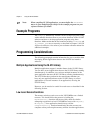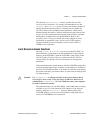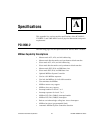
Chapter 6 NI-VXI Configuration Utility
©
National Instruments Corporation 6-29 VXI/VME-PCI8022 for Solaris
Normally, when a cycle maps from the MXIbus to the VXI/VMEbus,
any retry response received on the VXI/VMEbus is passed to the
MXIbus. If you enable the Auto Retry feature, the VXI/VME-MXI-2
automatically retries any VXI/VME cycle that receives a retry
response instead of passing a retry response on to the MXIbus. The
VXI/VME-MXI-2 automatically continues to retry the VXI/VME cycle
until it receives either a DTACK or BERR response, which it then passes
to the MXIbus.
Notice that the VXI/VME-MXI-2 has a limit on the number of
automatic retries it will perform on any one cycle. If the limit is
exceeded and the VXI/VME-MXI-2 receives another retry, it will pass
a retry back to the MXIbus even though Auto Retry is enabled.
Transfer Limit
You can use this feature to control how many data transfers the
VXI/VME-MXI-2 will perform on the MXIbus before releasing it to
another master device that is requesting use of the bus. The default
setting holds the MXIbus for an unlimited period of time.
The other options you can choose from are 16, 64, and 256 transfers.
If you do not want the VXI/VME-MXI-2 to hold the MXIbus for an
unlimited period of time, you can use this control to select one of these
values.
Parity Checking
By default, MXIbus parity checking is enabled and should not be
disabled under normal circumstances. MXIbus parity is always
generated regardless if checking is enabled or disabled.
MXI Fair Requester
You can use the Operate as Fair Requester checkbox control to
configure the VXI/VME-MXI-2 as either a fair or unfair requester on
the MXIbus. In its default setting (disabled), the VXI/VME-MXI-2
will request the bus at any time. If you enable this option, the
VXI/VME-MXI-2 will request the MXIbus only when there are no
requests pending from other MXIbus masters. This prevents other
MXIbus masters from being starved of bandwidth.



